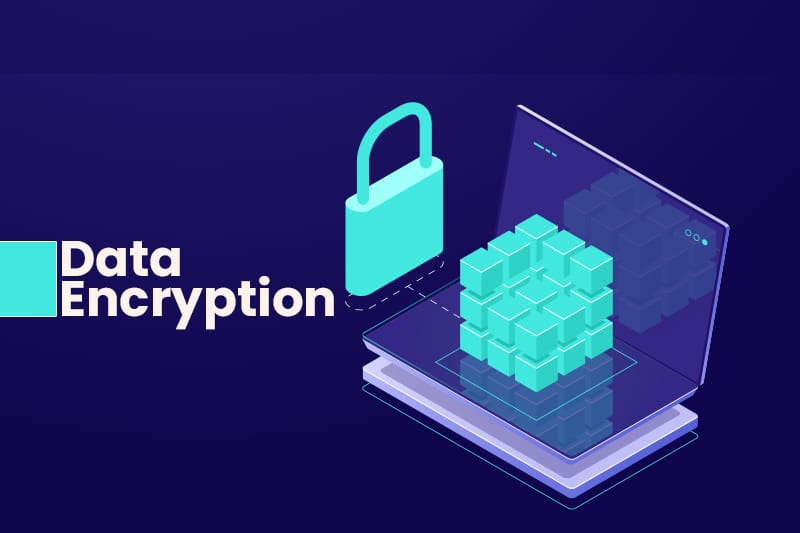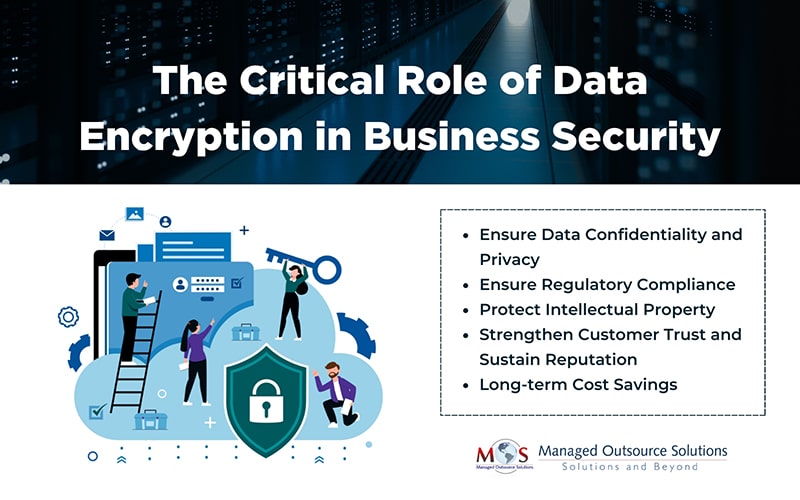Amid the rapid pace of digital transformation, businesses of all sizes and sectors continue to rely on innovative technologies and robust software tools to optimize their operations. However, this growing reliance on technology has introduced both significant advantages and notable challenges, with business data security emerging as the most pressing concern. Given the rise of cybercrime in the digital landscape, business owners must implement strict security protocols to protect their confidential information from unauthorized access, breaches, and cyber attacks. Widely used in a plethora of security solutions, encryption is one of the most effective methods to create a secure business environment.
What Is Data Encryption?
Encryption is the process of converting readable information (plain text) into an unreadable format (cipher text) using complex algorithms and cipher keys. The encrypted data provides a critical layer of security by ensuring that only authorized personnel with the decryption key can access and decrypt the original information. This process helps businesses to protect sensitive information, such as customer information and financial records, while also mitigating legal repercussions, reputational damage, and revenue loss. Encryption for sensitive information protection can be applied to two states of data, known as:
- Data-at-rest – It refers to the inactive information stored in locations such as hard drive, servers, or cloud, where it is not currently being transmitted or processed.
- Data-in-transit – This refers to the information being sent across networks, such as between two devices or from on-premises to the cloud.
Although both of the aforementioned states are at risk of potential breaches, data in transit is especially vulnerable to theft or tampering through cyber attacks. This heightened risk arises from its exposure on public networks and the dynamic nature of data as it moves across systems. The continuous flow increases the likelihood of interception, making it a prime target for malicious actors. For instance, professional outsourcing providers deploy robust data encryption solutions when receiving and sending client information, ensuring secure data transmission and compliance with industry-specific data privacy regulations
Role of Encryption in Business Data Protection Strategies
In today’s highly competitive business climate, protecting sensitive information is critical for ensuring organizational integrity, maintaining operational continuity, and achieving industry compliance. Encrypting plays a pivotal role by not only protecting business information, but also rendering it unintelligible to threat actors, even in the event of a breach. Let’s explore a few more reasons why businesses should prioritize encryption as part of their security strategy:
- Data Confidentiality and Privacy
Encryption ensures the confidentiality and privacy of crucial business information by making it unreadable to unauthorized individuals without the decryption key. As numerous business records, reports, and information are continuously exchanged and used in an operational environment, securing sensitive and restricted data assets—even during a successful cyber intrusion—is essential to prevent unauthorized manipulation. This way, enterprises can ensure operational continuity, minimize disruptions, and prevent costly downtime.
- Regulatory Compliance
In many industries, implementing robust data security measures isn’t optional but a necessity due to the stringent regulatory frameworks such as HIPAA and CCPA. Organizations operating within these sectors are legally required to protect sensitive customer information, such as health data, financial details, and other personally identifiable information. Encryption software plays a vital role in helping businesses meet these regulatory demands by providing an essential layer of protection for all types of data. By meeting compliance requirements for business data encryption, businesses can reduce risk of severe penalties, including substantial fines and significant legal consequences.
- Protecting Intellectual Property
For businesses, intellectual property can be the cornerstone of long-term success, representing a wide range of creative and technological innovations. Safeguarding critical business assets such as patents, algorithms, design rights, and trade secrets is crucial for retaining a competitive market position. Encryption offers an additional layer of security to ensure that sensitive business information, such as product development blueprint or strategic plans, is kept secure from competitors and cybercriminals seeking to exploit this information for financial gain.
- Strengthen Customer Trust and Sustain Reputation
In this information age, consumers are more conscious than ever about how their data is handled. When businesses implement strong encryption practices, they signal to customers that their privacy and data security are top priorities. A survey by PwC reveals that over 85% of customers would discontinue doing business with an organization if it mishandled or lost their personal information. Leveraging encryption techniques helps build trust, foster brand loyalty, and strengthen customer relationships. This, in turn, boosts the company’s reputation by demonstrating its commitment to responsible data management.
- Long-term Cost Savings
Investing in encryption can result in significant long-term cost savings for businesses. The financial toll of a data breach can be immense, including direct expenses related to legal fees, fines, revenue leakage, and customer compensation. Furthermore, the damage to a company’s reputation and customer trust can lead to lasting consequences that are difficult to recover from. By incorporating encrypting methods as part of the comprehensive security standard, companies can proactively shield themselves from cyber threats, effectively reducing the risk of breaches and their associated costs. In the long run, this not only safeguards valuable information but also helps businesses avoid the financial burden of remediation, allowing them to allocate resources more efficiently and preserve profitability.
Best Practices for Implementing Data Encryption
Implementing robust encryption strategy in companies requires a thorough understanding of their unique business goals, the types of data they handle, and a well-defined incident response plan. As not all encryption algorithms are equally effective, staying updated with the latest technologies, trends, and protocols is essential to select the right tools for your business. Additionally, encryption should be applied consistently across all data storage, transmission, and processing areas, ensuring sensitive information protection at all stages. Let’s explore the best practices that businesses should follow to maximize the benefits of encryption:
- Assess the unique goals and objectives of the business. Identify and categorize data based on type, state, sensitivity, and regulatory requirements to develop an effective encryption policy.
- Select the reputable, industry-standard encryption software and algorithm such as AES (Advanced Encryption Standard) or RSA (Rivest-Shamir-Adleman) that align with the company’s security policy. Ensure the chosen tool is customizable, scalable, and adaptable to future business and security requirements.
- Securely manage, update, and store decryption keys. Effective control over decryption keys is vital to safeguard encrypted information from unauthorized access. Implement policies for secure key generation, storage, rotation, and revocation, and ensure that access to decryption keys is strictly controlled and monitored.
- Ensure encryption is applied consistently across all stages such as data-at-rest, in transit, and in use to provide comprehensive protection. This ensures that sensitive information remains secure regardless of where it is stored or how it is being transferred.
- Regularly update and patch encryption tools and protocols. Stay proactive in updating your security systems by regularly checking for vulnerabilities, applying security patches, and transitioning to newer protocols when necessary. This helps mitigate the risks associated with evolving cyber threats.
- Conduct periodic audits and risk assessments to regularly review the effectiveness of your security strategy. Identify potential weaknesses, assess compliance with regulatory requirements, and make necessary improvements.
- Provide ongoing training to employees about the importance of encryption, how to implement it correctly, and how to recognize and respond to potential security threats. Educated employees can be a key line of defense in protecting sensitive information.
Enhance Business Security with Outsourcing Services
Businesses that use outsourced data management services should partner with a company that deploys robust data encryption strategies to protect sensitive information from unauthorized access or cyber threats. These companies leverage automation for the encryption process, ensuring that all critical business information they handle in securely encrypted throughout the outsourcing process. By utilizing advanced technologies, these services safeguard business assets while maintaining operational efficiency, enhancing trust among customers and stakeholders.





